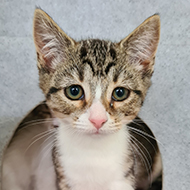
Charity stresses importance of vaccination.
Cats Protection is reminding owners of the importance of getting their cats vaccinated, after some kittens in the charity's care almost lost their eyes due to cat flu.
Brought into Cats Protection's Cornwall Adoption Centre with three other siblings from their litter, four-month-old Cherrim and Hattrem came in with cat flu, and their eyes were so badly inflamed that it was thought the kittens would have to have them removed.
Manager of the Cornwall Centre, Samantha Lawton, shared that pet owners aren't always informed about the consequences of cat flu, and the importance of vaccination: “We’re not sure many people realise that cats can catch flu and that it can be life threatening.
“Hattrem and Cherrim were lucky we got to them in time and their sight was saved. Often it’s too late and the poor cat has to live with only one eye or none at all.”
Cherrim had to be operated on for entropion, as his eyelids had turned inwards.
The charity is informing owners that the easiest way to prevent the impact of severe cat flu is to get their cats vaccinated, which, it stresses, does not prevent cats from catching it, but helps to prevent symptom severity.
Sarah Elliott, central veterinary officer of Cats Protection, explained: “Like humans, cats most likely to be worse affected are the very young, very old or those with a damaged immune system, as they find it more difficult to fight off infections.
“Although the symptoms might be similar, humans can’t catch cat flu but it’s highly contagious between cats.
“So, if you have more than one cat, it’s really important to keep them all vaccinated and, if one of your cats gets flu, make sure you wash the bedding and bowls they use thoroughly to help reduce the chances of spreading the flu between the cats.”
The charity is signposting cat owners to its website, which features a webpage on cat flu, for further information on the illness and the importance of vaccinations.
Image (C) Cats Protection



 The latest
The latest